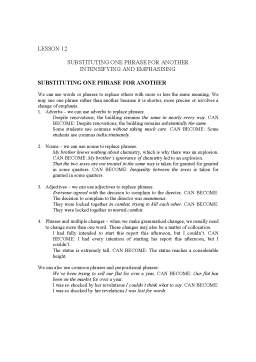Extras din curs
SUBSTITUTING ONE PHRASE FOR ANOTHER
INTENSIFYING AND EMPHASISING
SUBSTITUTING ONE PHRASE FOR ANOTHER
We can use words or phrases to replace others with more or less the same meaning. We may use one phrase rather than another because it is shorter, more precise or involves a change of emphasis.
1. Adverbs – we can use adverbs to replace phrases.
Despite renovations, the building remains the same in nearly every way. CAN BECOME: Despite renovations, the building remains substantially the same.
Some students use commas without taking much care. CAN BECOME: Some students use commas indiscriminately.
2. Nouns – we can use nouns to replace phrases.
My brother knows nothing about chemistry, which is why there was an explosion. CAN BECOME: My brother’s ignorance of chemistry led to an explosion.
That the two sexes are not treated in the same way is taken for granted for granted in some quarters. CAN BECOME: Inequality between the sexes is taken for granted in some quarters.
3. Adjectives – we can use adjectives to replace phrases.
Everyone agreed with the decision to complain to the director. CAN BECOME: The decision to complain to the director was unanimous.
They were locked together in combat, trying to kill each other. CAN BECOME: They were locked together in mortal combat.
4. Phrases and multiple changes – when we make grammatical changes, we usually need to change more than one word. These changes may also be a matter of collocation.
I had fully intended to start this report this afternoon, but I couldn’t. CAN BECOME: I had every intention of starting his report this afternoon, but I couldn’t.
The statue is extremely tall. CAN BECOME: The statue reaches a considerable height.
We can also use common phrases and prepositional phrases:
We’ve been trying to sell our flat for over a year. CAN BECOME: Our flat has been on the market for over a year.
I was so shocked by her revelations I couldn’t think what to say. CAN BECOME: I was so shocked by her revelations I was lost for words.
PRACTICE
1. Finish each if the following sentences in such a way that it is close as possible in meaning to the sentence before it.
a. What was being proposed was far-reaching in the extreme.
It ………………………………………………………………………………………..
b. The builders put in an enormous amount of work to ensure their customers were happy.
The builders went to………………………………………………………………….
c. The little girl looked remarkably like her grandmother at the same age.
The little girl bore …………………………………………………………………….
d. The water is over fifty meters deep at this point.
The water reaches …………………………………………………………………...
e. The painter was greatly inspired by the Italian masters.
The painter derived …………………………………………………………………..
f. The boxer was severely injured by his opponent.
His opponent inflicted ………………………………………………………………..
2. For each of the sentences below, write a new sentence as similar as possible in meaning to the original sentence, but using the word given.
a. The campaign was at its most intense just before the election.
peak …………………………………………………………………………………...
b. The fact that I am the managing director’s niece is beside the point.
neither ………………………………………………………………………………...
c. Nobody died in the explosion.
fatalities ………………………………………………………………………………
d. My teacher is always criticizing my paragraphing.
fault ……………………………………………………………………………………
e. Sam couldn’t stop crying when he lost his favourite toy.
floods …………………………………………………………………………………
f. The two lawyers worked in an atmosphere where neither trusted the other.
mutual ………………………………………………………………………………..
3. Replace the underlined phrases with one of the nouns listed. Make any other necessary changes.
malnutrition inferiority
Preview document
Conținut arhivă zip
- Lesson 12 - Curs Engleza.doc




















